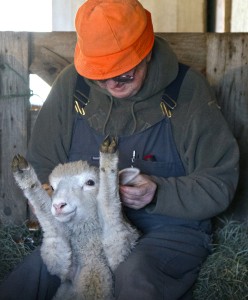By Joanna Becket
 [1]
[1]FOXBORO, ONT. (30/03/11) â Retired teacher, Elwood Palmateer, keeps 30 Arcott sheep on a 58-acre farm he runs with his wife Barb, on Mudcat Road near Foxboro, Ont., where more than 20 lambs have been born over the last few weeks, with more expected. Here, heâs in the process of tagging the ears of his three-month-old Arcott purebred sheep that have recently been sold for breeding purposes. Photo by Joanna Becket.
Elwood Palmateer keeps more than one baby monitor at his bedside.
Palmateer is on alert for any cries of distress from one of his 30 sheep that are lambing this month. His quick response to a mother in labour might make the difference between saving a newborn and losing one. Thirty-one lambs were born over the last few weeks and more are expected.
“It saves a lot of trips to the barn,” he says about the baby monitors.
Palmateer, a retired school principal from Stirling Public School, has been raising sheep for 32 years on the 58-acre farm he runs with his wife Barb, on Mudcat Road near Foxboro.
He raises Arcott purebred sheep, a breed developed in Canada to provide high fertility, milking and mothering characteristics. Palmateer sells purebreds to buyers across Canada as breeding stock and for their meat.
“The lambs that were born at Christmas are big enough to go to market,” he says. “So the larger ones will go in the next few weeks and the smaller ones we’ll hold over until Easter at the end of April. This is the time of year when they bring really top prices.”
Sheep may come and go, but Palmateer has a special place in his heart for one ewe that’s birthed 23 or 24 lambs over the years.
“We never had the heart to get rid of her,” he admits. “The kids call her Grandma.”
His interest in sheep developed when he and Barb Palmateer were teaching in Scotland for a year in 1963.
“That’s when we got to know a little about sheep,” he explains. “But it really happened because of the goats,” he said.
“A friend of mine recommended we buy goats so we could have a supply of milk for our son who was allergic to cow’s milk. And then he convinced me I should have sheep as well,” he adds. “And it went from there. The most we’ve had is 100 sheep.”
When the lambs are born, it’s a busy time at the farm, Palmateer says. There are several steps to the process, some of them routine, some of them critical.
They don’t want to lose a lamb.
“First we dip their navels in iodine to prevent infection, then we have to tag them so we know who they are. We put yellow tags in the females’ ears, white tags in the males’, twins’ in the right, singles’ in the left. We also put a rubber ring on their tail which causes it to atrophy and fall off.”
A mother can’t usually raise more than two lambs, Palmateer explains. Any extra lambs are taken away. These orphans require bottling with warm colostrum to help build up their immune systems.
In the more serious cases, they are bathed in warm water, wrapped in blankets and nurtured back to health by Barb who cares for the most fragile lambs in the mudroom of the house.
Newborns also spend three days in ‘the jug,’ a separate pen where they have time to bond with their mothers.
If all goes well, after a few days they join the others in the community ‘creep,’ a larger area where the lambs romp on shaky legs and cluster in the hay for warmth.
Although he refers to raising sheep as his “hobby,” Palmateer takes his work very seriously. He is also active in the community and is one of the original members at the Hastings Stewardship Council, an organization focused on maintaining the region’s agricultural and natural resources.
“He’s always coming up with great ideas,” says Cliff Maclean of Roslin, another council member. “It was his idea to create a forest trail at the Frink Centre to help people learn to identify the various species of trees. There are at least 32 species of trees in the area.”
He’s also known to liven up council meetings with his great sense of humour, Maclean adds.
Besides the sheep, the farm’s menagerie includes two border collies, one mutt who is part Australian blue heeler, a donkey and two barn cats.
They keep the donkey to ward off coyotes.
“I went to the estate sale of an old friend when he passed away to get a souvenir of his friendship and I came home with a donkey,” he said.
“We’ve had her now for 16 years and she’ll probably live to be 40 or 50. She’ll outlive me, I know.”